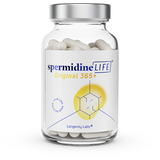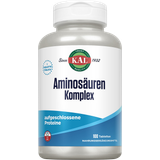Fasting - A Healthy Break
Fasting has been undertaken for centuries. Over time, many different kinds of fasting have emerged. There are juice fasts, buttermilk or whey fasts and many more. Here we'll take a closer look at the tradition.
What is fasting?
Fasting is simply not eating hardly any solid food. While fasting, nutrients are taken in in liquid form.
As such, fasting is not unusual. Over the years, fasting was a normal part of life. Today, the overabundance of food at hand means that we hardly ever go without food. In reality, the human body can deal with fasting much better than it can with overeating. This is one reason why overweight people experience such bad health.
Who is fasting useful for?
Every healthy adult person can fast. Fasting is not recommended for sick people, children, adolescents, pregnant or lactating women. A full range of nutrients and calories are important for these people, so they should not be fasting.
People who are underweight or who have suffered from an eating disorder should not fast. In the latter case, fasting could trigger a relapse.
What happens in the body during fasting?
After about a day after your the food intake has been restricted, the liver begins to metabolize the fat reserves of the body and convert them into energy. To achieve these results, you can't consume more than 500 calories within 24 hours. Fasting is thus not a starvation diet. That would be not good, because then the body would begin to break down muscle. A small amount of calories and exercise can keep this from happening.
Why is fasting beneficial to the body?
The effects of fasting are varied, but always positive. This is confirmed by many studies.
- Break unhealthy eating habits: after fasting, you may no longer crave unhealthy foods. Vegetarian and vegetable foods will taste even better.
- A new awareness of your diet
- Learning to listen to your body again
- A generally feeling of increased well being
- Mood improvements adjust themselves after a few days. Fasting can make you feel more cheerful and less nervous.
- Release tensions
- A positive effect on the intestinal flora
- Fasting is good for the metabolism: the decrease sugar and cholesterol levels, normalizes the blood pressure.
- Cleanses the intestine. Digesting is hard work and is stressful for the body. Therefore giving the digestive system a break is good for the body.
- Breaks down proteins that have been sitting around in your body
How long should you fast?
An optimal fast lasts between five to seven days. Anything that goes beyond a week is too much and should be monitored by a doctor!
Once you are finished fasting, start slow. For three days afterword, avoid meat, sausage and fats and eat a light diet. Do not go from 0 - 100, as it can be a burden for your body.
Can you also lose weight with a detox program?
Fasting or detoxing may cause you to lose weight, but once you start eating regularly again, you may see a yo-yo effect. It is better to use the fast as a fresh start toward healthy eating.
Before you start fasting, it is best to Inform yourself first about which treatment would work best for you. Decide whether you prefer to fast at home, as part of a group, or under supervision.
You also don't have to be so extreme. Doing a detox week where you simply avoid unhealthy foods and eat small portions can also have a positive impact.
Latest reviews
-
 4.6 (7)
4.6 (7)Nature Love Organic Grapefruit Extract, 50 ml
- Gentle cold extraction
- Made from grapefruit seeds & peels
- One bottle lasts for 3 weeks
€ 16,49 (€ 329,80 / l)Delivery by May 07
-
 4.3 (3)
4.3 (3)Ketofabrik Chocolate Coconut Bar, 1 bar
- 1g sugar per bar
- Reduced sugar alternative
- 3.6g net carbs per bar
€ 1,59Not available at the moment
-
 4.7 (11)
4.7 (11)Longevity Labs spermidineLIFE® Original 365+, 60 capsules
- Approved EU wide as a novel food
- From Austria
- No artificial dyes or flavours
€ 69,49Delivery by April 17
-
 € 39,99 (€ 285,64 / kg)
€ 39,99 (€ 285,64 / kg)Delivery by April 17
